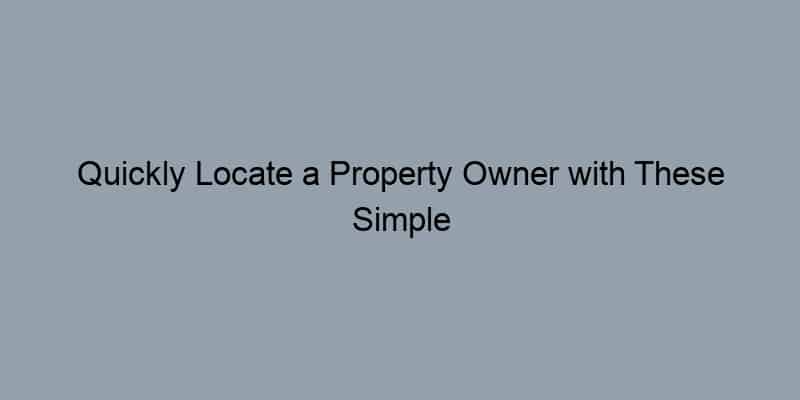Have you ever wondered who owns that charming house down the street or that vacant lot that’s been sitting there for years? Whether you’re looking to purchase, make an inquiry, or simply satisfy your curiosity, finding property ownership information can be a daunting task. Fortunately, it doesn’t have to be. With the right strategies in your toolkit, you can quickly locate a property owner and get the information you need without breaking a sweat. Let’s dive into some simple strategies that can lead you to the owner in no time!
1. Utilize Online Public Records
The easiest way to find property owner information is to search through public records. Many local governments maintain online databases that offer access to property records. Simply visit your local county assessor’s website, input the property’s address, and you can often view details about the owner, assessed values, and property history.
Tip: Always ensure you’re accessing official government websites to avoid fraudulent sites that could misuse your information.
2. Use Property Search Websites
There are several dedicated platforms designed to help people find property owner information. Websites like Zillow, Realtor.com, and PropertyShark often include property details, including owner information, property tax assessments, and sometimes even past sales history.
Tip: Look for advanced search options to narrow down your results. You can filter by state, county, or even neighborhood for more accurate information.
3. Leverage Social Media
In today’s digital age, many property owners and real estate entities have a social media presence. Searching platforms like Facebook or LinkedIn can lead you straight to the owner or someone connected to them. You might find a property management company or a real estate agent who represents the property.
Tip: Don’t forget to use specific search terms related to the property or neighborhood for the best results!
4. Networking in the Neighborhood
Sometimes, the simplest method is to just ask around. Strike up conversations with neighbors or local business owners near the property in question. They may have valuable insights or even know the owner personally.
Tip: Make sure to approach conversations casually and respectfully; you don’t want to come off as intrusive.
5. Visit the Local Courthouse or Tax Assessor’s Office
If you’re struggling to find ownership information online, the local courthouse or tax assessor’s office should be your next route. Most of the time, you can access property records directly in person. Requesting access to these records can yield results not available on the web, including liens or any pending issues related to the property.
Tip: Bring a government-issued ID or any required documents to facilitate the process.
6. Hire a Research Specialist
If you’re still unsuccessful after trying the previous methods or if your inquiry is complex, consider hiring a research expert or a private investigator. These professionals have the tools and experience to locate property owners quickly and efficiently, although this may come with a fee.
Tip: Always check reviews and seek recommendations when hiring someone for property searches.
7. Use Official Property Records Websites
For those seeking a reliable and user-friendly way to gather property records, using a dedicated website like OfficialPropertyRecords.org can be invaluable. This platform offers free access to a wealth of property records, making it easier than ever to find ownership details without the hassle.
FAQs
Q1: Is it legal to search for property owner information?
Yes, searching for property ownership records is legal and often publicly accessible. However, you should be cautious about how you use this information.
Q2: What information can I find about a property owner?
You can often find the owner’s name, contact information, the property’s assessed value, tax information, and property history, all depending on local laws and what is available on public record.
Q3: Are there any fees associated with accessing property records?
While some local governments charge fees for copies of documents, there are many free resources available. Websites like OfficialPropertyRecords.org offer free access to a variety of property records.
Q4: What if the property owner is a business?
If the property is owned by a business entity, you may need to do additional research to find the responsible individual. Look at the business registration information filed with the state for potential contacts.
Q5: Can I remain anonymous when searching for property owner information?
You can search for property ownership anonymously. However, if you want to contact the owner, you will need to reveal your identity.
Conclusion
Finding a property owner doesn’t need to be an exhaustive task. With tools like online public records, property search websites, and local resources, you can quickly locate the information you need. If you want to streamline your process and ensure that you’re getting comprehensive and accurate details, visiting OfficialPropertyRecords.org is highly recommended. This platform provides free access to a wealth of property records, enabling you to get the information you seek without any hassle.
So, whether you’re looking to buy, inquire, or simply satisfy your curiosity, take these strategies to heart and start your search for that elusive property owner today!

